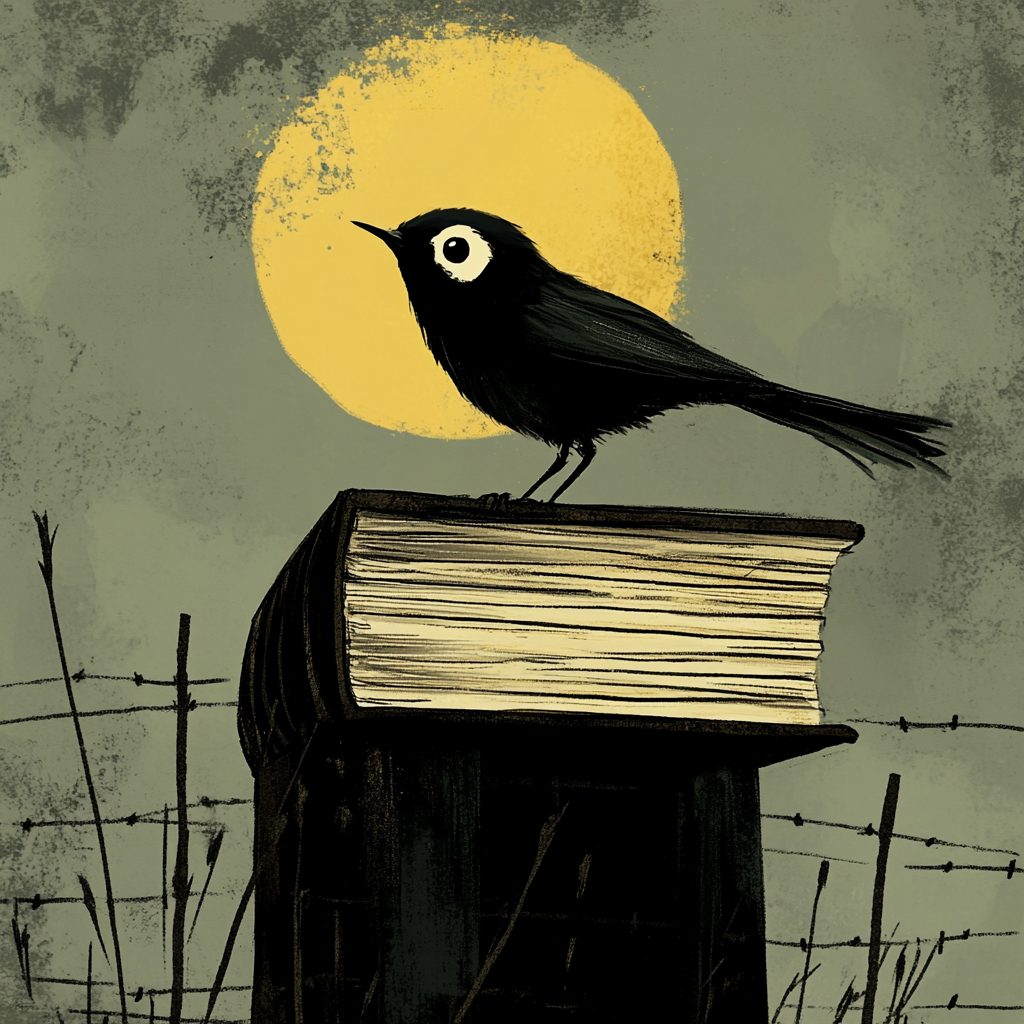Blog
The Unsettling Prescience of Ray Bradbury's Fahrenheit 451
When Ray Bradbury published Fahrenheit 451 in 1953, television was still a novelty, the internet wasn't even a concept, and social media existed only in the realm of science fiction. Yet somehow, this visionary author peered through time to warn us …
Myopic Thinking in Fahrenheit 451: Ray Bradbury’s Warning for a Distr…
Ray Bradbury's Fahrenheit 451 presents a haunting vision of a society that has embraced ignorance over enlightenment, comfort over truth, and distraction over depth. At its core, the novel centers around a profound warning about the dangers of myopi…
Fahrenheit 451 and the Phoenix: A Powerful Symbol of Destruction, Reb…
Ray Bradbury's Fahrenheit 451 remains one of literature's most powerful warnings about censorship and intellectual freedom. At the heart of this dystopian masterpiece lies a symbol that transcends the narrative—the phoenix. This mythological b…
The Power of Obfuscation: Lessons from Fahrenheit 451
In Ray Bradbury's dystopian masterpiece Fahrenheit 451, we encounter a society where books are burned, independent thinking is dangerous, and truth is deliberately obscured. At the heart of this manipulation lies the concept of obfuscation – t…
Sagacious: The Quiet Power of Clarice McClellan in Fahrenheit 451
In Ray Bradbury's dystopian masterpiece Fahrenheit 451, characters don't often get the chance to develop wisdom. The society Bradbury crafted deliberately stunts intellectual growth, replacing meaningful conversation with wall-sized televisions and …
Fire and Emotional Release in Fahrenheit 451: Learn the Word ‘Cathart…
Exploring the concept of catharsis in Ray Bradbury's Fahrenheit 451 reveals profound layers of meaning in this dystopian masterpiece. The word "cathartic"—defined as providing psychological relief through the expression of strong emotions&mdas…
The Mechanical Hound in Fahrenheit 451: A Symbol of Inexorable Techno…
The mechanical hound from Ray Bradbury's Fahrenheit 451 stands as one of literature's most haunting symbols of automated control—a technological nightmare that embodies the concept of being "inexorable." This powerful adjective, meaning relent…
Exploring Transmutation: The Heart of Fahrenheit 451's Powerful Messa…
Ray Bradbury's dystopian masterpiece Fahrenheit 451 remains one of literature's most potent warnings about censorship, intellectual freedom, and the dangers of a society that abandons critical thinking. At its core lies a profound concept that drive…
Exploring "Anathema" through the Lens of Fahrenheit 451: When Knowled…
In Ray Bradbury's chilling dystopian masterpiece, Fahrenheit 451, we're confronted with a society where books aren't revered—they're reviled. This literary classic presents us with a world where firemen don't extinguish flames; they ignite the…
The Seminal Power of 'To Kill a Mockingbird': How Harper Lee's Novel …
Language has the power to shape our world, and certain works of literature transcend their pages to become cultural touchstones that forever alter our collective consciousness. In our latest Word of the Day podcast episode, we explored the concept o…
Kinship in To Kill a Mockingbird: How Harper Lee Explores Family, Loy…
In Harper Lee's timeless novel "To Kill a Mockingbird," the concept of kinship emerges as a central theme that binds characters and drives the narrative in profound ways. Today's exploration of this powerful word reveals how deeply it resonates not …
The Power of Empathy: Lessons from Atticus Finch and Scout's Journey
In a world increasingly divided by differences in opinion, background, and perspective, there's perhaps no skill more valuable than empathy. The ability to truly understand others—not just observe them from a distance, but to feel what they mi…
What True Resilience Looks Like: Lessons from Atticus Finch in To Kil…
The concept of resilience is powerfully illustrated through the character of Atticus Finch in Harper Lee's masterpiece, "To Kill a Mockingbird." In today's exploration of this essential vocabulary word, we dive into what true moral courage looks lik…
The Enduring Relevance of "To Kill a Mockingbird" in Modern Society
Harper Lee's "To Kill a Mockingbird" stands as one of literature's most remarkable achievements, not merely for its artistic merit, but for its uncanny ability to remain profoundly relevant across generations. Published in 1960, this novel continues…
The Profound Symbolism of "To Kill a Mockingbird": A Vocabulary Deep …
Harper Lee's "To Kill a Mockingbird" stands as one of American literature's most enduring classics, not merely for its compelling narrative but for its profound use of symbolism that continues to resonate with readers decades after its publication. …
Understanding Benevolence: Lessons from To Kill a Mockingbird | Premi…
In our latest episode of Premier Writing Lab's Word of the Day, we delve into "benevolence," a word that encapsulates the profound impact of kindness, generosity, and goodwill. This exploration goes beyond mere definition, revealing how benevolence …
Understanding Prejudice Through To Kill a Mockingbird: Vocabulary, Ju…
In today's episode of Premier Writing Lab's Word of the Day, we delved deeply into the powerful term "prejudice" through the lens of Harper Lee's masterpiece, "To Kill a Mockingbird." This exploration wasn't just about adding another word to our voc…
What Boo Radley Teaches Us About Being Reclusive: Vocabulary and Less…
In Harper Lee's timeless novel "To Kill a Mockingbird," few characters captivate readers' imaginations quite like Arthur "Boo" Radley. This mysterious figure, rarely seen and often misunderstood, perfectly embodies today's vocabulary focus: the word…
The Power of Perception: Scout Finch's Journey to Understanding
In Harper Lee's timeless novel "To Kill a Mockingbird," we witness one of literature's most profound character transformations through the eyes of Jean Louise "Scout" Finch. Today's exploration of the word "perceptive" offers us a perfect lens throu…
Atticus Finch and the Power of Being Steadfast in To Kill a Mockingbi…
In our exploration of powerful vocabulary through literature, few characters exemplify the essence of a word as perfectly as Atticus Finch embodies "steadfast." This remarkable protagonist from Harper Lee's "To Kill a Mockingbird" serves as the mora…
Unlocking the Power of "Tumultuous" in To Kill a Mockingbird: Advance…
The power of language stretches far beyond simple communication—it captures entire worlds, emotions, and historical contexts within single words. In our latest Word of the Day episode, we delved into "tumultuous," a richly descriptive adjectiv…
Beyond Memorization: A Smarter Way to Master Vocabulary with Premier …
Premier Writing Lab's Word of the Day podcast stands apart in the crowded field of educational resources by offering a refreshingly effective approach to vocabulary acquisition. Unlike traditional methods that rely heavily on rote memorization, this…





















